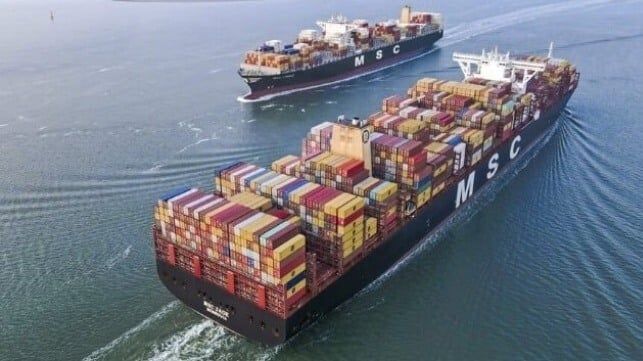Changes in Container Shipping as MSC Expands Lead to 20% Share

With a growing orderbook that is already at record levels and an overheated charter and secondhand market, the container shipping segment is going through rapid changes. The market has expanded to its largest overall capacity with significant additions still in the works while MSC Mediterranean Shipping Company has pulled away from the pack and continues to grow.
Both Alphaliner and Linerlytica are highlighting in their latest mid-year updates that the container shipping segment has reached a new threshold for capacity. Total capacity worldwide is now over 30 million TEU for the first time. Alphaliner calculates that there are 7,010 active ships representing over 358 million dwt.
MSC is driving growth in the segment while also pulling away from all its competitors. Started in 1970, the company reached 3 million TEU in 2017 with the explosive growth coming in recent years. From 4 million TEU in July 2021, MSC surpassed Maersk by January 2023 with a capacity of 4.2 million TEU and by May last year, they were at 5 million TEU.
In possibly the biggest irony of the battle between Maersk and MSC for dominance, MSC is buying tonnage once used by Maersk to help it reach new levels. The acquisition of a former 9,600 TEU Maersk vessel Alphaliner highlights pushed MSC to the 20 percent market share calculation and in striking distance of 6 million TEU.
Alphaliner writes that MSC is now just “one big ship delivery” away from surpassing the 6 million TEU mark. They calculate that MSC now has a total of 837 ships of which they own 539 and the total capacity is just 20,000 TEU shy of 6 million. They predict that MSC is just weeks away from hitting that mark but note it is far from complete. MSC has another 99 vessels on order according to Alphaliner which would add nearly 1.2 million TEU of capacity and even with scrapping some vessels, they predict MSC will reach over 7 million TEU by 2025.
MSC analysts note appears to be preparing to go it alone after the end of the alliance with Maersk by expanding its fleet. The future alliance of Maersk and Hapag-Lloyd due to launch in 2025 called the Gemini Cooperation will have 3.4 million TEU of capacity and a 22 percent market share. MSC will be comparable on its own with only the Ocean Alliance (CMA CGM, COSCO, and Evergreen) larger at an estimated 29 percent.
“The ordering frenzy is not over yet despite massive capacity influx,” notes Alphaliner in its market analysis. In the last week, they said 15 new containerships with a combined capacity of 80,500 TEU were delivered. Both Alphaliner and Linerlytica highlight that over 1.6 million TEU of capacity has been added to the sector in the first half of 2024. Linerlytica calculates that a further 1.49 million TEU will be delivered by the end of 2024. They highlight that nearly two ships a month will be delivered adding an average of nearly 315,000 TEU in each of the next six months.
The pace of new orders has also resumed with Alphaliner highlighting that 64 vessels have been ordered so far in 2024. That represents an additional 543,500 TEU of capacity. They note that half of the ships ordered will be equipped for dual fuel with methanol the hands-down winner with 24 ships compared to six for LNG propulsion.
The one change they note in the orderbook is the size of the vessels. After a rush to build the megamax vessels (over 20,000 TEU), the industry is focusing on feeders and midsized vessels. Alphaliner reports so far the largest vessel ordered are four Neopanamax 14,170 TEU ships for Germany’s Peter Dohle to be operated under charter by Dubai’s Emirates Shipping Lines.
The changes in the container segment are expected to continue to come according to analysts who also predict further orders. There will be additional changes in the leaderboard and possibly shifts in the alliances as the carriers respond to the market dynamics.



















































